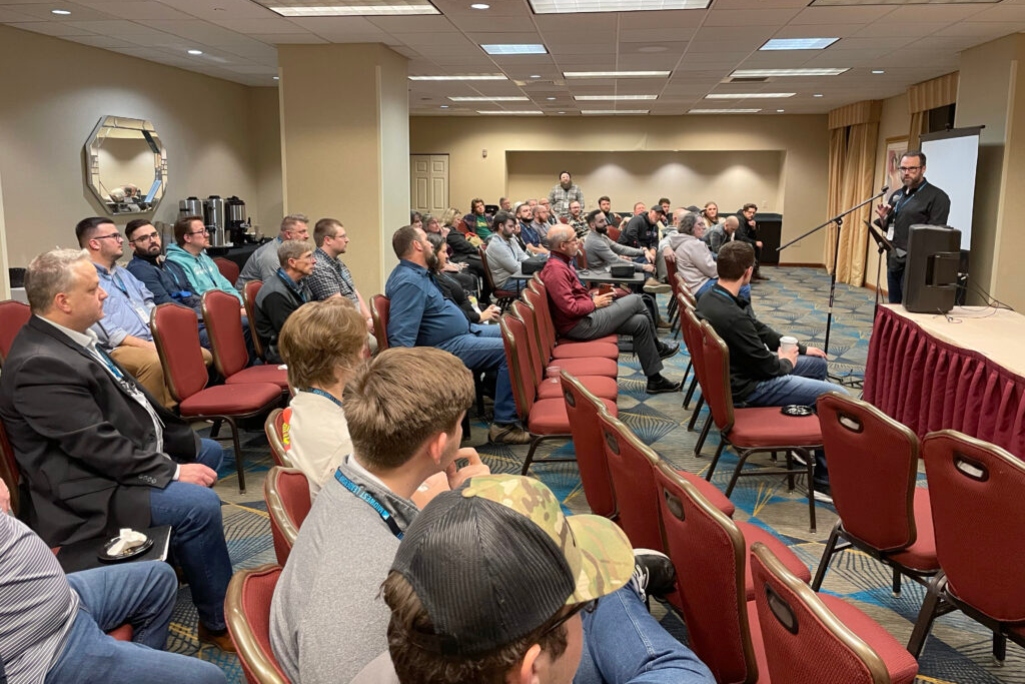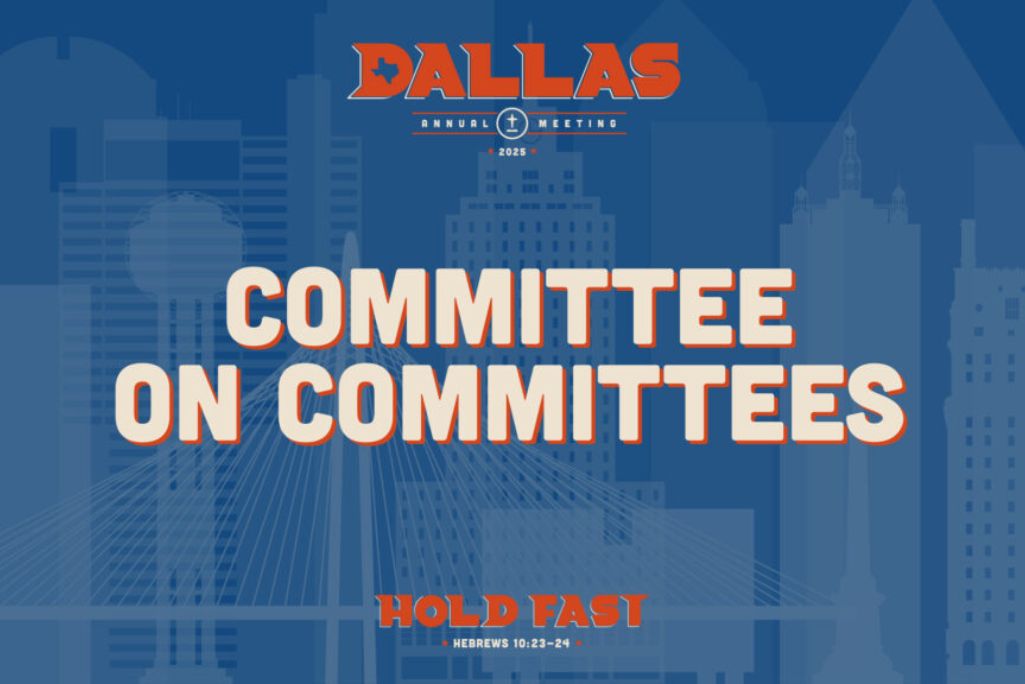
Eric Schumacher, Baptist Convention of Iowa director of pastoral ministry, speaks to pastors and church leaders at the 2024 Midwest Leadership Summit held in January.
NASHVILLE (BP) — As one of the smaller state conventions in the Southern Baptist Convention (SBC), Iowa has learned to take something traditionally seen as a disadvantage and make it an asset.
Size used to matter when it came to churches. It still does, of course. More people mean more resources and bigger budgets. However, as some say the megachurch movement is fading, there comes the desire to become smaller for the sake of effectiveness. Quality truly stands out over quantity.
Both are in play in Iowa, where about 80% of Southern Baptists attend a church with at least 400 attending worship, said state executive Tim Lubinus. With such a majority in a larger-church setting, the 37% increase in 2023 of those joining a small group is certainly one to celebrate.
“Something unique to Iowa is that our average church size is two to three times that of the national average,” said Lubinus. “When that’s the case, small groups get emphasized because that’s the way you connect.”
A significant contributor to the number of larger congregations in the state is the success of The Salt Network, a collegiate ministry Lubinus called a “leadership development machine” for churches. Lubinus himself was on staff at The Salt Network for 18 years before serving 16 years as an International Mission Board (IMB) missionary in East Asia and Central Asia.
A native Iowan who grew up helping his family farm 620 acres of corn and soybeans, Lubinus is in tune to the context of pastoral ministry there. Isolation is among those key issues.
“Even though there are all the online things, they still feel alone. The group they connect with is other pastors, and that doesn’t happen naturally, so the state convention serves well by facilitating those connections,” said Lubinus.
The goal is for those connections to ultimately lead to multiplying churches, disciples and mission opportunities. It happens locally and internationally, with Lubinus’ IMB background helping Iowa churches and the state convention support projects in Central Asia and Eastern Europe.
A focus on moving funds from the state directly to equipping pastors has been a hallmark of Lubinus’ leadership.
“We greatly reduced our administrative costs,” he said. “Sold the building and reinvested the money. Moved to home offices.”
Those steps set up Iowa to forward 75% of its receipts to the Cooperative Program (CP). As eye-opening as that number is, Lubinus hints that it may soon be exceeded.
“Just wait ‘til next year,” he said.
Partnership focus in Colorado
In the 2023 SBC Annual Church Profile (ACP), Colorado led the way in small group increases at 46%, followed by Utah-Idaho at 39%. That’s something to celebrate at the local church level. However, Mike Proud began focusing on partnerships when he became Colorado’s state executive in October 2021.
“It’s about collaboration, a vision the Lord gave me for this out of my associational experience,” said Proud, who had previously served as associational missions strategist for the Orange County Southern Baptist Association in Santa, Ana, Calif.
When he arrived, only two of Colorado’s 11 associations had paid leadership, and those were both part-time positions. Those positions had previously been supported by a cooperative agreement with the North American Mission Board (NAMB). But with that funding shifted toward church planting, associations struggled to fund leadership.
So, Proud spent the first year in his new role piling up 50,000 road miles to visit pastors. Most of that was spent traversing north and south on I-25, where 85% of the population lives. There were also drives into the mountains westward as well as east into the plains.
The result was a decentralization of the state convention office. Two open positions when Proud arrived were ultimately not filled. Those resources, along with some from the association, would instead be put toward funding regional directors.
“That person’s primary role would be to collaborate with the association and bring churches together for partnership,” said Proud. “In addition, they would serve as a member of the Colorado Baptists leadership team.”
Seven staff members — jointly funded by the state and associations — are serving in those roles. In addition to his executive responsibilities, Proud currently leads the association in the northeast corner of the state on an interim basis.
Adding regional directors was part of a larger decentralization of the state office, which went from six staff to three. Feedback received “from the field,” i.e. churches, would be prioritized as to generating resources.
“In many ways, the associational leaders and regional directors are extensions of our convention, and our convention is partners with our associations,” said Proud. “In every sense of the term, we are collaborative.”
Working across state lines
Stronger churches in Utah and Idaho are important because of the influence of the Mormon church as well as those states experiencing some of the largest increases in population since 2020. State executive Rob Lee cites the importance of partnerships to that end.
“We have three priorities: share Christ, start churches and strengthen existing churches,” said Lee. “Not one of those is above the other, and we funnel our time, energy and financial resources into those three areas.”
Its partnership with NAMB is crucial for training and church strengthening/planting.
“Obviously, the presence of the Mormon Church makes it different. It’s a large part of the population in Utah and significant in Idaho. A lot of folks don’t realize that there are greater percentages of the population in eastern Idaho that are Mormon than in Utah,” Lee said.
Familiar theological terms have different meanings, he added. “You really need to understand that when you’re talking with them, you think you’re talking about apples but they’re hearing oranges,” said Lee.
With no Baptist associations, the state convention has focused on churches networking directly with each other. Those networks and partnerships include churches outside of Utah and Idaho.
“We have a couple of areas where churches have a passion for revitalization and will come in to help a church that is struggling. They bring people and provide services to a church that otherwise would likely close its doors,” said Lee.
NAMB, Gateway Seminary and the Georgia Baptist Mission Board have partnered with Utah-Idaho churches. That includes the establishment three years ago, Lee said, of the Salt Lake School of Theology by Gateway Seminary that meets at local churches. Teams from Georgia have traveled to his state convention, but members of Utah-Idaho churches have conducted mission work such as Vacation Bible School in Georgia as well.
That spirit of partnership extends to a key point of state convention ministry, he said, whether the partnership is inside or outside state lines. “Many churches can partner and minister where one church couldn’t on its own. I do work across denominations, and a lot of their leaders talk about our nature of working together,” said Lee. “It shows we can meet just about any need for a church.”
(EDITOR’S NOTE — Scott Barkley is chief national correspondent for Baptist Press.)


